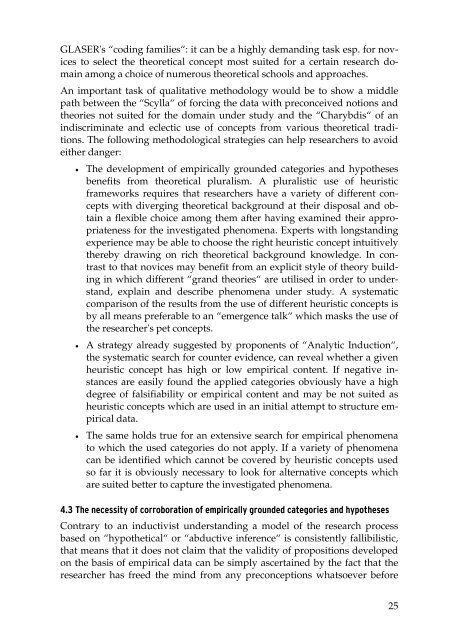Volltext - SSOAR
Volltext - SSOAR
Volltext - SSOAR
- TAGS
- volltext
- ssoar
- www.ssoar.info
Erfolgreiche ePaper selbst erstellen
Machen Sie aus Ihren PDF Publikationen ein blätterbares Flipbook mit unserer einzigartigen Google optimierten e-Paper Software.
GLASER's “coding families“: it can be a highly demanding task esp. for novices<br />
to select the theoretical concept most suited for a certain research domain<br />
among a choice of numerous theoretical schools and approaches.<br />
An important task of qualitative methodology would be to show a middle<br />
path between the “Scylla“ of forcing the data with preconceived notions and<br />
theories not suited for the domain under study and the “Charybdis“ of an<br />
indiscriminate and eclectic use of concepts from various theoretical traditions.<br />
The following methodological strategies can help researchers to avoid<br />
either danger:<br />
• The development of empirically grounded categories and hypotheses<br />
benefits from theoretical pluralism. A pluralistic use of heuristic<br />
frameworks requires that researchers have a variety of different concepts<br />
with diverging theoretical background at their disposal and obtain<br />
a flexible choice among them after having examined their appropriateness<br />
for the investigated phenomena. Experts with longstanding<br />
experience may be able to choose the right heuristic concept intuitively<br />
thereby drawing on rich theoretical background knowledge. In contrast<br />
to that novices may benefit from an explicit style of theory building<br />
in which different “grand theories“ are utilised in order to understand,<br />
explain and describe phenomena under study. A systematic<br />
comparison of the results from the use of different heuristic concepts is<br />
by all means preferable to an “emergence talk“ which masks the use of<br />
the researcher's pet concepts.<br />
• A strategy already suggested by proponents of “Analytic Induction“,<br />
the systematic search for counter evidence, can reveal whether a given<br />
heuristic concept has high or low empirical content. If negative instances<br />
are easily found the applied categories obviously have a high<br />
degree of falsifiability or empirical content and may be not suited as<br />
heuristic concepts which are used in an initial attempt to structure empirical<br />
data.<br />
• The same holds true for an extensive search for empirical phenomena<br />
to which the used categories do not apply. If a variety of phenomena<br />
can be identified which cannot be covered by heuristic concepts used<br />
so far it is obviously necessary to look for alternative concepts which<br />
are suited better to capture the investigated phenomena.<br />
4.3 The necessity of corroboration of empirically grounded categories and hypotheses<br />
Contrary to an inductivist understanding a model of the research process<br />
based on “hypothetical“ or “abductive inference“ is consistently fallibilistic,<br />
that means that it does not claim that the validity of propositions developed<br />
on the basis of empirical data can be simply ascertained by the fact that the<br />
researcher has freed the mind from any preconceptions whatsoever before<br />
25

















